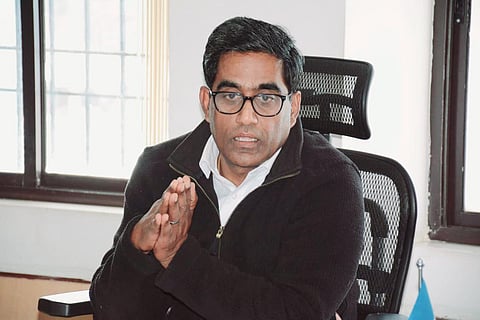

PATNA: Armed with expertise in fighting natural calamities like floods, Prataya Amrit is now waging an even tougher battle against the COVID-19 outbreak in Bihar.
The 1991-batch Bihar cadre officer of the IAS is leading the fight in his capacity as principal secretary of Bihar State Disaster Management Department in addition to being the CMD of the power department.
Known for completing electrification in villages before the deadline and establishing wide networks of world class roads and bridges, Amrit has successfully managed the arrival of over 1.8 lakh migrants from other states amid the lockdown in Bihar.
He was awarded the Prime Minister's Excellence Award in public administration in 2011 for turning around a dying Bihar State Bridge Construction Corporation into a profit-making unit.
Asked about his approach to leadership, Amrit says, "Empathy towards humanity and service to society are my guiding factors as I strive to do my best for the state as well as nation." The soft-spoken but result-oriented officer says he loves to be on the ground whenever an emergency arrives.
"Bihar reported its first COVID-19 death -- a 38-year-resident of Munger with a travel history -- on March 22. We then took the fight against it on a war footing besides taking on the burden of managing the huge influx of around 1.8 lakh migrants," he said, adding, "The backbone of the pandemic has been broken."
It was the encouragement of CM Nitish Kumar, chief secretary Deepak Kumar, additional chief secretary Amir Subhani and others that kept him working round the clock with others of the disaster management wing, he said.
In no time, 156 disaster relief centres were set up along the state's border areas and proper screening arrangements were made for migrants.
"Thereafter, the major challenge was how to place them under home or camp quarantine. We did it after many sleepless nights," he said.
A team of IT experts of his disaster management department also developed a first-of-its-kind app named 'Garur' within 24 hours of the outbreak reaching Bihar.
"The app has helped us track the travel history of more than 1.5 lakh international as well domestic travellers in Bihar and take follow-up action to beat the spread of COVID-19," he said.
"Altogether, 22 telephone lines including 20 incoming and 2 outgoing lines are manned by 45 personnel round the clock for tackling the pandemic," he said.
Besides the central helpline of 104, helplines of the labour, agriculture and food supply departments as well as district helpline numbers have been set up in all the districts under the DMs.
He also manages the meeting of Bihar's state Crisis Management Group, which is headed by chief secretary Deepak Kumar, and coordinates with the CM's secretariat. After taking a break of just 15 minutes for lunch, he is back to overseeing the entire disaster management operations of the state amid the outbreak.
"After a number of positive cases were detected in Bihar's five worst hit districts namely Siwan (29 positive cases), Nawada, Begusarai, Munger and Nalanda, work in these districts is reviewed daily with its DMs and the SPs through video conferencing," he said. Another major challenge would be to handle the arrival of migrants and people stranded in other places after the lockdown ends, he added.
Asked about the success of the state in containing the infection, he said the participation of officials, people, police and continuous monitoring of operations by CM Nitish Kumar helped curb the spread compared to other states with better resources.
He said testing facilities for COVID-19 have started at four places while permission for the fifth RT-PCR resting centre at Muzaffarpur's SKMCH has been granted by the ICMR and the NIV at Pune.
Bihar has become the first state in the country to provide financial assistance to migrants stuck in other states due to the lockdown by giving Rs 1000 each to them through their accounts, he said, adding that 3200 school quarantine centres have been set up to ensure 14 days of isolation for those who have returned.
Having entered the civil services after topping in the University of Delhi from Hindu College where he studied history, he has developed a network of technical experts on disaster relief and frequently holds consultations with them.
The community kitchens started for the first time during the floods in Bihar have also been replicated during the outbreak of COVID-19 in all districts and urban areas.